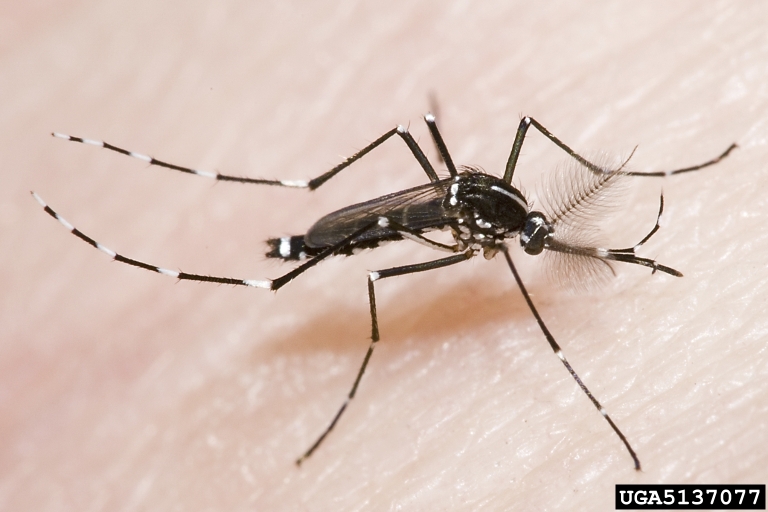
by Mark Tancig | Jul 29, 2021
Now that we’re getting plenty of rain and the temperatures are nice and toasty, our nemesis to enjoying the outdoors is back in full force. Yes, I’m talking mosquitoes, the reason for inventing window screens! If you’re gardening outside these days, you’ve probably been annoyed by one of the many mosquito species that occur in our area. Many of these mosquitoes are native species that play an important role in the food chain, feeding many aquatic and terrestrial wildlife, but some of them, like the daytime biting Asian tiger mosquito, are invasive species that were accidentally introduced. While mosquitoes are an important food source to more charismatic critters, they are annoying and can spread disease, and so we can benefit by reducing their presence.
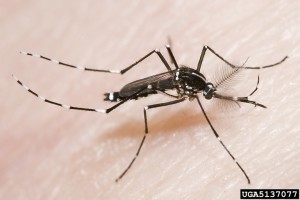
The Asian tiger mosquito, another annoying invasive species. Photo credit: Susan Ellis, Bugwood.org.
In addition to the age-old advice of draining any standing water, there are other control methods that can be very effective at reducing the mosquito population. One of the most effective and least-toxic options is the use of Bti products. These products come in granular or “donut” forms with the smaller granules being best for various uses around the home and the dunks/donuts for larger areas of standing water like ponds. These Bti products are considered a type of biological control since it is a species of bacteria, Bacillus thuringiensis israelensis to be precise, that causes mosquito, blackfly, and fungus gnat larvae to perish as they wiggle around and grow into their pupal stage. Because it only affects a narrow range of species, it is considered a selective pesticide that does not cause harm to non-target species, such as bees, birds, butterflies, frogs, lizards, and other desirable garden visitors. Bti can be sprinkled into rain barrels, bird baths, bromeliads, gutters, and other places where water may stand more than 5-7 days, the amount of time needed for mosquito eggs to develop into adults.
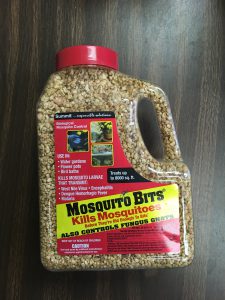
Bti granules prevent mosquito larvae from becoming biting adults. Photo by: Mark Tancig, UF/IFAS.
If considering other methods of mosquito control, such as the use of foggers, keep in mind that many of the pesticides used to control adult mosquitoes are not selective products and can kill the pollinators you may be trying to invite to your garden. Additionally, planting citronella plants, eating copious amounts of garlic, wearing repellent bracelets, or using ultra-sonic devices or cell phone apps has not been shown to repel mosquitoes so stick to what is known to work.
For a more enjoyable mosquito season, keep the window screens tight, wear long pants and sleeves and use appropriate repellents when outdoors, and do your best to minimize standing areas of water. If you have questions about mosquitoes and their control, visit the UF/IFAS Florida Medical Entomology Lab website (https://fmel.ifas.ufl.edu/) and browse the many resources available.
by Mark Tancig | Jun 4, 2018
In north Florida, the arrival of warm weather and plenty of rain means it’s time to battle the mosquitoes again. Those pesky little blood-suckers are out and about, often keeping us from enjoying our outdoor pursuits. With some preventative steps, you can reduce the potential for mosquitoes to occur in your yard.
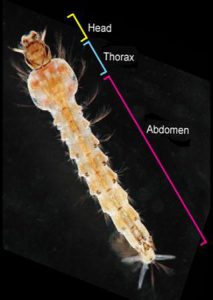
Mosquito larvae. Credit: Florida Medical Entomology Laboratory.
As we should all be aware of by now, mosquitoes require water to complete their lifecycle. Eggs are laid near the water and will dry out if they do not remain near a water source. The larvae, or “wrigglers”, that hatch from the eggs, are aquatic and will not survive out of water. The pupae, often called “tumblers”, are also aquatic and must be in water to survive. From the pupae hatch the adults, the growth stage we want to avoid.
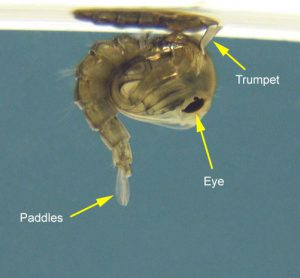
Mosquito pupae. Credit: Florida Medical Entomology Laboratory.
The best method to reduce mosquitoes in your yard is to remove or empty water-holding containers. This prevents the conditions needed for the egg through pupae stages to survive. These water-holding containers can include birdbaths, old buckets, gutters, tarps, rain barrels, and a variety of other items. Even a small bottlecap is enough to breed mosquitoes. Regularly emptying these water-holding containers every 3 to 5 days will stop that most annoying final life stage – the biting adults.
Another way to prevent the aquatic stages of mosquitoes from thriving is to use a larvaecide, specifically Bti. Bti is a bacterium that is sold as either small dunks or doughnuts and can also be found as small granules. Placing a dunk or a few granules in a birdbath will prevent larvae from developing and won’t harm the birds or other organisms that may visit, including frogs, bees, butterflies, and mammals. Bti is a selective pesticide, only effective for control of mosquito, midge, and fungus gnat larvae.
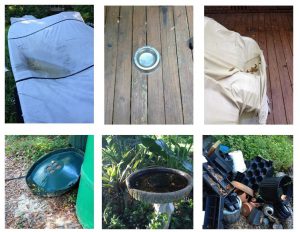
Various mosquito breeding habitats. Credit: Mark Tancig, UF/IFAS
Even if you’ve cleaned up or drained all water-holding containers on your property, there will likely still be some adult mosquitoes looking for a bloodmeal. Wearing long pants and sleeves, using mosquito repellents, and keeping window screens in good order are effective methods to prevent being bitten.
Local mosquito control agencies will often provide services to fog for adults. However, this will want to be your last resort, as the pesticides used to control adults are not as selective as the Bti used for the larvae. This results in non-target damage, meaning that insects besides mosquitoes, including beneficial insects, may also be harmed. Therefore, controlling mosquitoes during their aquatic lifestages helps reduce the need for pesticides that can harm beneficial insect populations.
The UF/IFAS Florida Medical Entomology Laboratory Research and Education Center has a great website – https://fmel.ifas.ufl.edu/ – of mosquito-related information, including the various species of mosquitoes in Florida and which repellents work the best. For additional information on controlling mosquitoes and other pests, please contact your local Extension Office.
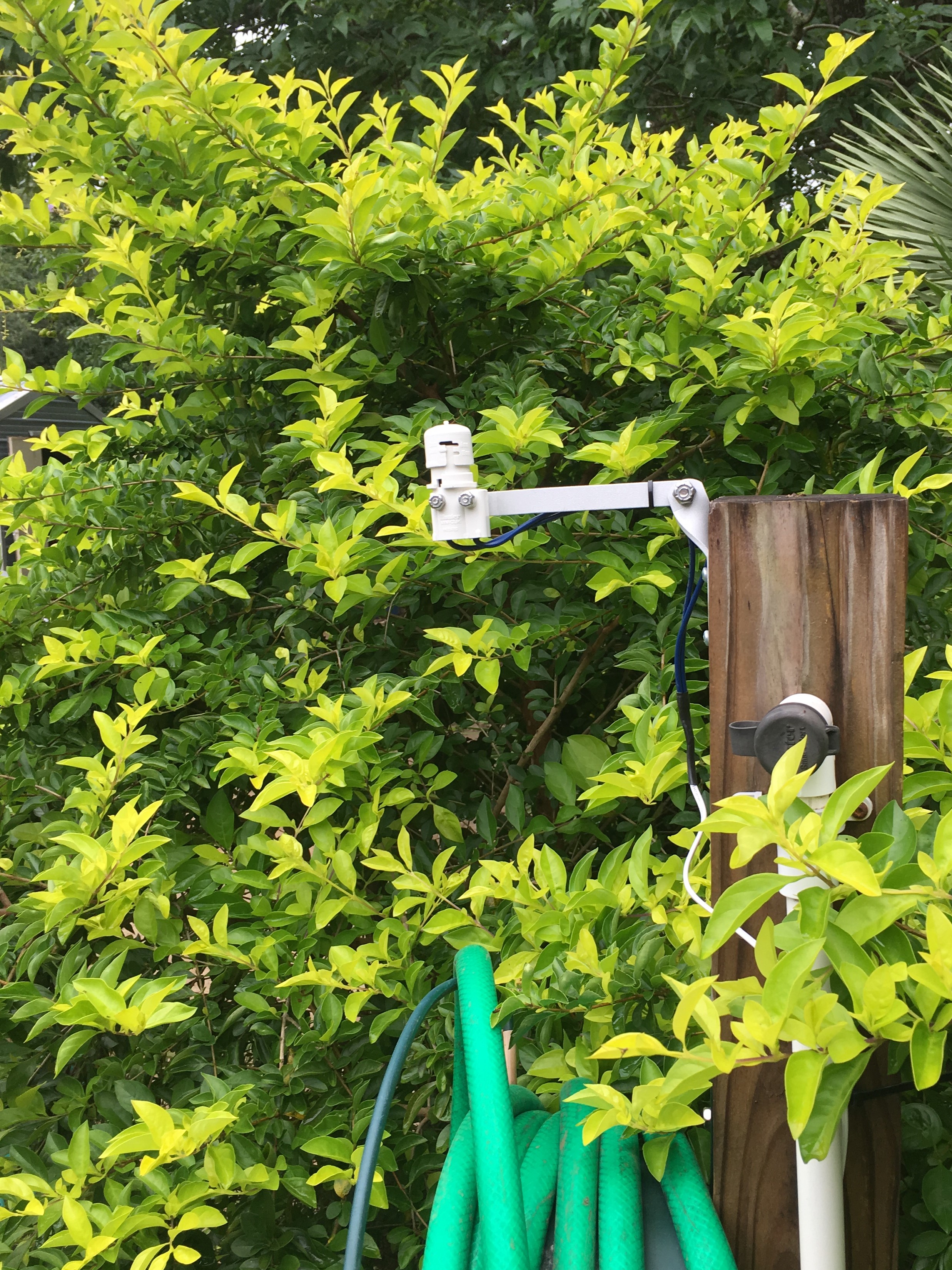
by Mark Tancig | Jun 22, 2017
Recent rains in the panhandle have kept many gardeners indoors. While we’re mostly watching the rain from inside, there are some lawn and landscape tasks to consider.
The most obvious is to turn off any automatic irrigation systems. Although rain shut-off devices are required for all automatic irrigation systems in Florida, many homeowners’ systems are not properly installed, are turned off, or are absent all together. Irrigating during times of adequate rainfall not only wastes a precious natural resource, but it can also be damaging to your turf and landscape plants by creating the perfect conditions for disease, especially fungi.
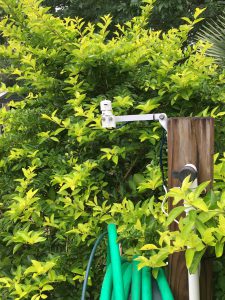
A rain shut-off device ensures that your irrigation system doesn’t come on during rainy weather. Photo by: Mark Tancig, UF/IFAS.
Something else to consider during all of this rain are potential mosquito breeding sites. Our most irritating mosquito species, those day-biting Asian tiger mosquitoes, love to breed in any small or large, water-holding containers around the house, including birdbaths, plant pot saucers, watering cans, five-gallon buckets, tarps, rain barrels, and the list goes on. The best method of control is to drain these containers every three to five days to prevent mosquito larvae from hatching. Another way to reduce larvae from hatching is to use a Bti product, which come in donut shaped dunks or as crumbles that can be sprinkled in the container. Bti controls mosquito, blackfly, and fungus gnat larvae, but does not harm beneficial insects and animals like birds, bees, butterflies, lizards, and frogs. If mosquitoes from the swamp or wetland behind your lot worry you, remember that those ecosystems have a diversity of insects that prey on mosquito larvae. Those containers in the yard do not have predators and can be a large source of the most aggravating mosquito species. For control of larger areas, including those natural ecosystems, contact your local mosquito control agency for assistance.

Bti bits are a way to prevent mosquito larvae from becoming biting adults. Photo by: Mark Tancig, UF/IFAS.
If you like to play in the rain a little, this is a good time to walk around and observe any runoff issues in the yard (make sure to do this only when it’s safe!). The ideal situation is to have runoff drain away from the house and percolate into landscaped areas. When surveying the yard in the rain, things to look for include areas of standing water (that could be a good location for a rain garden) and areas where erosion may be occurring (consider using berms or plantings to better direct and slow the water). Before doing any major drainage work, always check with your local building department. Some municipalities may require permits to ensure your improvements do not affect your neighbors or others downstream.
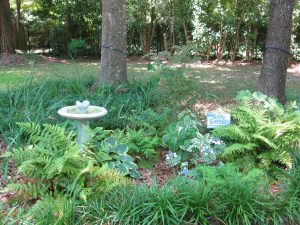
Rain gardens can turn a low, soggy spot into an aesthetic addition to your yard. Photo by: Courtney Schoen, TAPP.
If you have any questions about rain shut-off devices, mosquito control, or stormwater runoff, contact your local UF/IFAS Extension office for more information. Enjoy the rain; it will be sunny and hot before you know it!









